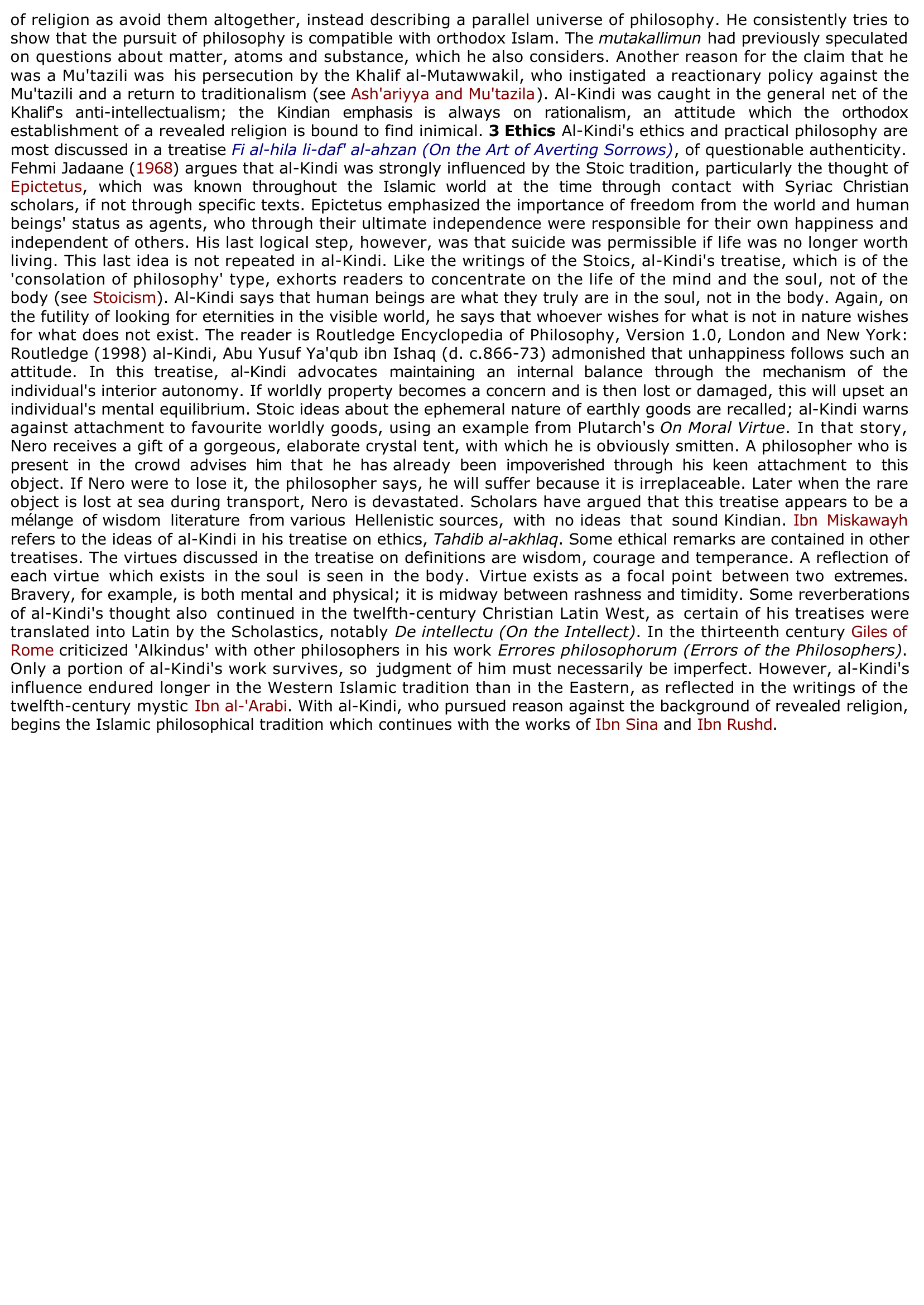al-Kindi, Abu Yusuf Ya'qub ibn Ishaq
Publié le 15/01/2010
Extrait du document
«
of religion as avoid them altogether, instead describing a parallel universe of philosophy.
He consistently tries toshow that the pursuit of philosophy is compatible with orthodox Islam.
The mutakallimun had previously speculated on questions about matter, atoms and substance, which he also considers.
Another reason for the claim that hewas a Mu'tazili was his persecution by the Khalif al-Mutawwakil, who instigated a reactionary policy against theMu'tazili and a return to traditionalism (see Ash'ariyya and Mu'tazila ).
Al-Kindi was caught in the general net of the Khalif's anti-intellectualism; the Kindian emphasis is always on rationalism, an attitude which the orthodoxestablishment of a revealed religion is bound to find inimical.
3 Ethics Al-Kindi's ethics and practical philosophy are most discussed in a treatise Fi al-hila li-daf' al-ahzan (On the Art of Averting Sorrows) , of questionable authenticity. Fehmi Jadaane ( 1968 ) argues that al-Kindi was strongly influenced by the Stoic tradition, particularly the thought of Epictetus , which was known throughout the Islamic world at the time through contact with Syriac Christian scholars, if not through specific texts.
Epictetus emphasized the importance of freedom from the world and humanbeings' status as agents, who through their ultimate independence were responsible for their own happiness andindependent of others.
His last logical step, however, was that suicide was permissible if life was no longer worthliving.
This last idea is not repeated in al-Kindi.
Like the writings of the Stoics, al-Kindi's treatise, which is of the'consolation of philosophy' type, exhorts readers to concentrate on the life of the mind and the soul, not of thebody (see Stoicism ).
Al-Kindi says that human beings are what they truly are in the soul, not in the body.
Again, on the futility of looking for eternities in the visible world, he says that whoever wishes for what is not in nature wishesfor what does not exist.
The reader is Routledge Encyclopedia of Philosophy, Version 1.0, London and New York:Routledge (1998) al-Kindi, Abu Yusuf Ya'qub ibn Ishaq (d.
c.866-73) admonished that unhappiness follows such anattitude.
In this treatise, al-Kindi advocates maintaining an internal balance through the mechanism of theindividual's interior autonomy.
If worldly property becomes a concern and is then lost or damaged, this will upset anindividual's mental equilibrium.
Stoic ideas about the ephemeral nature of earthly goods are recalled; al-Kindi warnsagainst attachment to favourite worldly goods, using an example from Plutarch's On Moral Virtue .
In that story, Nero receives a gift of a gorgeous, elaborate crystal tent, with which he is obviously smitten.
A philosopher who ispresent in the crowd advises him that he has already been impoverished through his keen attachment to thisobject.
If Nero were to lose it, the philosopher says, he will suffer because it is irreplaceable.
Later when the rareobject is lost at sea during transport, Nero is devastated.
Scholars have argued that this treatise appears to be amélange of wisdom literature from various Hellenistic sources, with no ideas that sound Kindian.
Ibn Miskawayh refers to the ideas of al-Kindi in his treatise on ethics, Tahdib al-akhlaq .
Some ethical remarks are contained in other treatises.
The virtues discussed in the treatise on definitions are wisdom, courage and temperance.
A reflection ofeach virtue which exists in the soul is seen in the body.
Virtue exists as a focal point between two extremes.Bravery, for example, is both mental and physical; it is midway between rashness and timidity.
Some reverberationsof al-Kindi's thought also continued in the twelfth-century Christian Latin West, as certain of his treatises weretranslated into Latin by the Scholastics, notably De intellectu (On the Intellect) .
In the thirteenth century Giles of Rome criticized 'Alkindus' with other philosophers in his work Errores philosophorum (Errors of the Philosophers) . Only a portion of al-Kindi's work survives, so judgment of him must necessarily be imperfect.
However, al-Kindi'sinfluence endured longer in the Western Islamic tradition than in the Eastern, as reflected in the writings of thetwelfth-century mystic Ibn al-'Arabi .
With al-Kindi, who pursued reason against the background of revealed religion, begins the Islamic philosophical tradition which continues with the works of Ibn Sina and Ibn Rushd ..
»
↓↓↓ APERÇU DU DOCUMENT ↓↓↓
Liens utiles
- al-Razi, Abu Bakr Muhammad ibn Zakariyya'
- Abu al-Fida Abu al-Fida (1273-1331), historien et géographe arabe, issu de la dynastie des Ayyubides, né à Damas, également connu sous le nom d'Ismail ibn Ali.
- AL-JAHIZ ABU UTHMAN AMR IBN BAHR
- RÉVÉLATIONS MECQUOISES (LES) ou LES CONQUÊTES MECQUOISES, Ibn 'Arabï
- ABU TELFAN ou Le retour de la Montagne de la Lune (résumé & analyse)

































